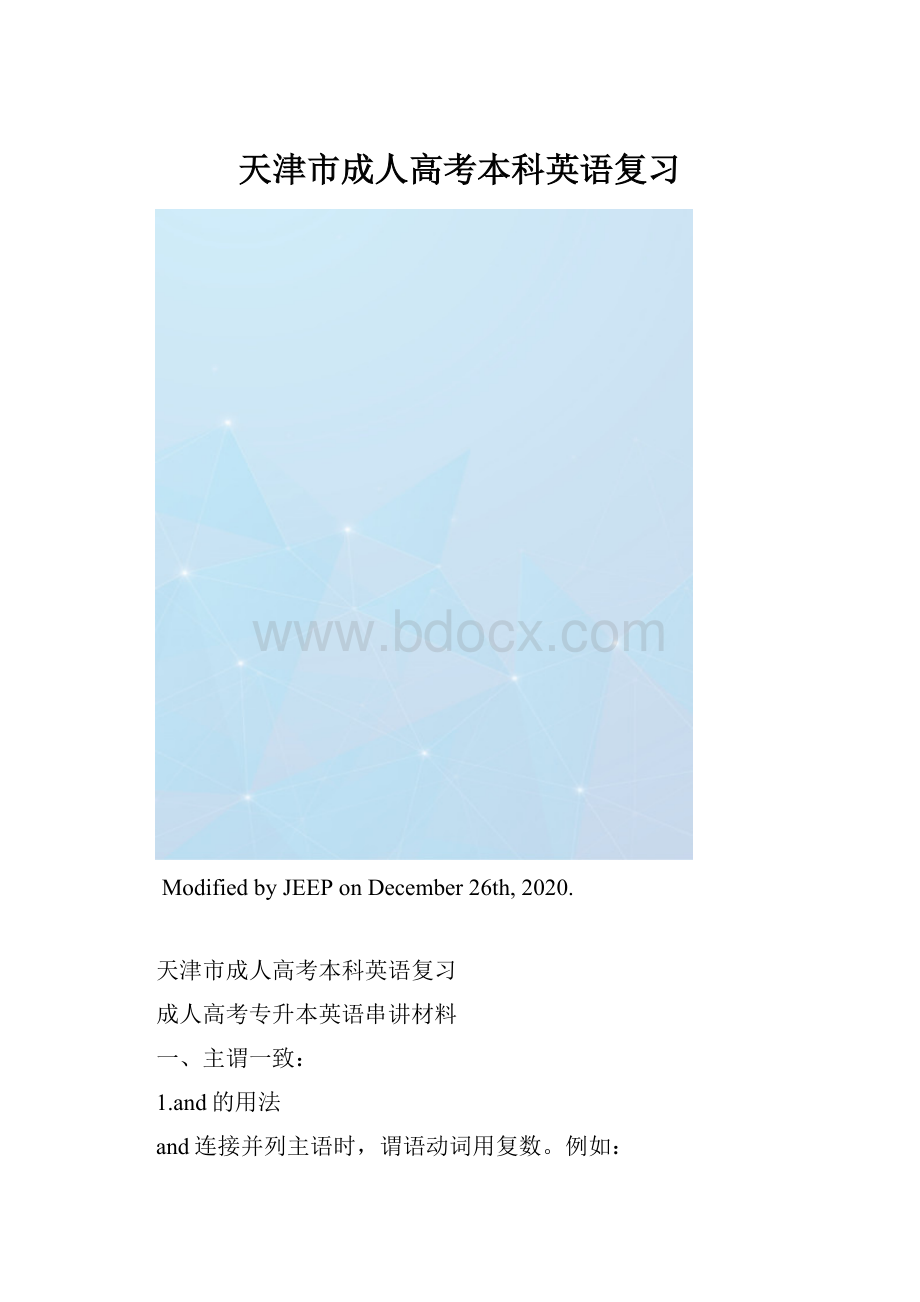天津市成人高考本科英语复习.docx
《天津市成人高考本科英语复习.docx》由会员分享,可在线阅读,更多相关《天津市成人高考本科英语复习.docx(53页珍藏版)》请在冰豆网上搜索。

天津市成人高考本科英语复习
ModifiedbyJEEPonDecember26th,2020.
天津市成人高考本科英语复习
成人高考专升本英语串讲材料
一、主谓一致:
1.and的用法
and连接并列主语时,谓语动词用复数。
例如:
BothheandIareright.
Mr.BlackandMrs.BlackhaveasoncalledTom.
但并列主语如果指的是同一人,同一事物或同一概念,谓语动词用单数,例如:
Histeacherandfriendisabeautifulgirl.
Thepoetandwriterhascome.
当连接的是两个不可分的东西时,谓语动词用单数,例如:
Whiskyandsodaismyfavoritedrink.
Breadandbutterismyfavoritesnack.
由and连接的并列主语中如果有each,every,no修饰时,其谓语动词要用单数形式。
例如:
Everyboyandeverygirlhasadictionaryathand.
Eachmanandeachwomanhasadancingpartnerattheparty.
Inourcountryeveryboyandeverygirlhastherighttoreceiveeducation.
2.就近原则:
not…but…,notonly…butalso…,either……or,…,neither……nor…,therebe…,here…
以上词语连接两个主语时,以离动词最近的主语形式为准,如:
EitherMr.Smithorhiswifeandsonshavetofacethedifficulties.
Therearefourteenchairsandawhiteboardinthemeetingroom.
经典试题:
Oneormorepagesaremissing.
TheheadmasterorIamgoingtohandoutthepapers.
3.就远原则:
with,alongwith,togetherwith,including,except,but,besides,ratherthan,insteadof
以上词语连接两个主语时,以离动词远的主语形式为准,如:
Thelibraryincluding5,000bookswasburntdownlastnight.
Theteacherratherthanthestudentswaswrong.
4.集合名词:
Family,class,group,team,crew,committee,等
如以上名词作主语时,如果指一个整体,谓语动词就是单数;如果指成员时,谓语动词用复数,如:
Theclassismadeupof40students.
5.单独的动名词,不定式,从句,时间,金钱,距离,学科,疾病,组织(专有名词)做主语时,谓语动词用单数,如;
Swimmingisgoodforyou.
Fiftydollarsistoomuchforme.
Fathergavemeadictionaryasabirthdaygift,whichmakesmeexcited.
Physicsisreallydifficultformetolearn.
练习:
1.Breadandbutter____whatAmericansusuallyhaveforbreakfast.
A.areB.isC.wasD.were
2.Eachboyandgirl____givenagiftonlastChristmasDay.
A.isB.areC.wereD.was
3.NobodybutJackandJane____madegreatprogressintheclassrecently.
A.haveB.hasC.hadD.hasbeen
4.NotonlyhebutalsoI____toworkhardandpasstheexam.
A.wantB.wantsC.wantedD.wanting
5.Goingtobedearlyandgettingupearly____agoodhabit.
A.isB.areC.wereD.was
6.Statistics____hismostdifficultsubjectandtheyareallworriedthathewon'tpassthetest.
A.isB.areC.wasD.were
7.Statistics____thatmostofthepublishedandquotedscientificarticlesarerelatedtomedicalscience.
A.hasshownB.isshownC.showD.shows
8.Twohundredandfiftypounds____toounreasonableapriceforasecond-handcar.
A.isB.areC.wereD.be
9.Uptonow,themajorityoftheundergraduates____enrolledforthisselectedcourse.
A.hasbeenB.haveC.hadbeenD.wouldhavebeen
10.Thepolice__askedthemmanyquestionsabouttheaccident.
A.hadB.hasC.haveD.hadbeen
二.定语从句:
定语从句由关系代词who、whom、whose、which、that、as和关系副词where、when、why等,说得简单点就是用这些词代替上一句中重复的部分。
1.关系代词who,which,that的考点:
Iknowthegirl.ThegirlworksinIBM.
Iknowthegirlwho/thatworksinIBM.
Theoldmanisafamousartist.Wevisitedtheoldmanyesterday.
Theoldmanwho/thatwevisitedyesterdayisafamousartist.
ThelaptopismadebyDELL.Iboughtthelaptoplastweek.
Thelaptopwhich/thatIboughtlastweekismadebyDELL.
先行词为以下情况,关系代词必须用that:
1.先行词被形容词最高级修饰:
Heisthehardest-workingstudentthatIhaveevertaught.
2.先行词被序数词修饰:
Heisthefirstmanthatfinishedtheworkontime.
3.先行词被only,just,thesame,next等词修饰:
ThisistheonlydictionarythatIhaveathand.
4.先行词本身为不定代词:
IsthereanythingthatIcandoforyou
5.先行词中既包含人又包含物:
Weknownothingaboutthedoctorsandthehospitalsthatyouaretalkingabout.
6.正式用法中,先行词是动物的时候
Wehavetoprotectwhalesandsharksthatarebeingthreatenedbydeath.
2.whose的考点:
whose就是重复关系代词及关系代词的所属关系,很好判断。
Iknowtheboy.Theboy’sfatherworksinazoo.
Iknowtheboywhosefatherworksinazoo.
Ilostthebook.Thebook’scoveristorn.
Ilostthebookwhosecoveristorn.
3.关系副词when,where,why的考点
这三个词就是代替主句中的时间,地点和原因。
比如:
Istillrememberthemonthwhenwemetforthefirsttime.
Istillremembertheairportwherewemetforthefirsttime.
Istillrememberthereasonwhywemetforthefirsttime.
why是最简单的一个,看见reason就选它。
难点1:
关系副词=介词+关系代词
Istillrememberthemonthwhen/inwhichwemetforthefirsttime.
Istillremembertheairportwhere/atwhichwemetforthefirsttime.
Istillrememberthereasonwhy/forwhichwemetforthefirsttime.
why最简单,记住固定结构for+which
用哪个介词加which是先行词决定的,只要熟练掌握介词加名词就能顺利选出答案。
看下列例题:
1.IpreferSundays______________IcandosomethingIenjoy.
2.Thisisthehospital______________Ihavebeenworkingfor10years.
难点2
为了使句子简洁,定语从句中尽量不要出现介词,这个时候把动词词组的介词提到关系代词之前,如:
ThisisthefactorywhichIworkedinin1997.
ThisisthefactoryinwhichIworkedinin1997.
Thisisthesongwhichhealwayslistensto.
Thisisthesongtowhichhealwayslistensto.
经典试题:
1)SoonIcametotheclub______Tombelongs.
A.whereB.inwhichC.towhichD.that
2)Heistheman_____Italkedaboutwithyouyesterday.
A.whomB.towhomC.aboutwhomD.who
4.非限定性定语从句
试比较:
Pleasegototheofficewhichisonthesecondfloor.
Pleasegotomyoffice,whichisonthesecondfloor.
非限定性定语从句的考点就是“which”代替逗号前的整个句子,比如:
Hegavemeadictionaryasabirthdaygift,whichmademehappy.
基本意思就是“一件事情,引出……结果
注意:
非限定定语从句中不能使用that和why。
当which代替整个主句时,并且能翻译成“正如”的时候,就可用“as”代替,并提到句首。
如:
Chinawillbeanadvancedcountryin20years,whichweallknow.
Asweknow,Chinawillbeanadvancedcountryin20years.
练习:
1.Theplace_______interestedmemostwastheChildren'sPalace.
A.whichB.whereC.whatD.inwhich
2.Doyouknowtheman_______
A.whomIspokeB.towhospokeC.IspoketoD.thatIspoke
3.Thisisthehotel_______lastmonth.
A.whichtheystayedB.atthattheystayed
C.wheretheystayedatD.wheretheystayed
4.Doyouknowtheyear______theChineseCommunistPartywasfounded
A.whichB.thatC.whenD.onwhich
5.Thatistheday______I'llneverforget.
A.whichB.onwhichC.inwhichD.when
6.Thisisoneofthebestfilms_______.
A.thathavebeenshownthisyearB.thathaveshown
C.thathasbeenshownthisyearD.thatyoutalked
7.Canyoulendmethebook______theotherday
A.aboutwhichyoutalkedB.whichyoutalked
C.aboutthatyoutalkedD.thatyoutalked
8.Thepen______heiswritingismine.
A.withwhichB.inwhichC.onwhichD.bywhich
9.Theyarrivedatafarmhouse,infrontof______satasmallboy.
A.whomB.whoC.whichD.that
10.Itthereanyoneinyourclass______familyisinthecountry
A.whoB.who'sC.whichD.whose
11.I'minterestedin______youhavesaid.
A.allthatB.allwhatC.thatD.which
12.HeisgoodatEnglish,______weallknow.
A.thatB.asC.whomD.what
13.Hetalkedalotaboutthingsandpersons______theyrememberedintheschool.
A.whichB.thatC.whomD.what
14.Inourfactorythereare2,000workers,twothirdsof____arewomen.
A.themB.whichC.whomD.who
15.Ilostabook,______Ican'tremembernow.
A.whosetitleB.itstitleC.thetitleofitD.thetitleofthat
16.LastsummerwevisitedtheWestLake,____Hangzhouisfamousintheworld.
A.forwhichB.forthatC.inwhichD.what
三、倒装
把动词放到主语之前就叫倒装,倒装分为完全倒装和部分倒装。
1.完全倒装
就是把所有的谓语动词都提到主语之前,一般由方位介词和方位副词引导,如:
Themanagerstandsinfrontofthecar.
Infrontthecarstandsthemanager.
注意:
不要只把方位介词提前,与方位介词有关的词汇都提前,并且注意主语和谓语动词之间的形式。
Theoldmanwalkeddowntothehillslowly.
Thebirdflewuptothebluesky.
试把两句话变成完全倒装。
方位副词为here,there,我们熟悉的therebe句型就属于完全倒装句型,如:
Thereisabookonthedesk.
Herecomesthebus.
Hereisthemoney.
Hereyouare.
以上几个句子都是方位副词使用的方法。
完全倒装里的一个重要考点是要记住:
完全倒装中主语是人称代词时,主谓顺序不变。
2.部分倒装
部分倒装只需要把助动词提到主语之前,通常引导部分倒装的词语为:
hardly,never,seldom,little,rarely,neither,nor,no,not,only,so如:
IhaveneverbeentotheUnitedStated.改为:
NeverhaveIbeentotheUnitedStates.
试把以下句子变成倒装句:
1)Ihavenevermethimbefore.
2)Hehardlygoesoutafterwork.
3)IseldomateoutwhenIwasyoung.
以上为简单句的倒装,考试中经常出现并列句及从句的倒装考点,如由并列结构notonly…butalso…,neither…nor…,复合句结构onlywhen…,nosooner…than…,scarcely/hardly…when…
切记:
并列句只在很有倒装结构的分句上倒装,复合句只在主句上倒装。
1)Notonly(hecan)playmusicalinstrument,butalso(hecan)repaircars.
2)Neither(hewant)totellthenews,nor(Iwant)toask.
3)Nosooner(heget)homethanit(rain).
4)Onlywhenyouareawaretheimportanceoftheposition,(youcan)performwell.
5)Hardly(Ileave)than(hearrive).
练习:
1.Nosooner______themselvesintheirseatsinthetheatre______thecurtainwentup.
A.theyhavesettled;beforeB.hadtheysettled;than
C.havetheysettled;whenD.theyhadsettled;than
2.I’veneverseenthatmovie.__________haveI.
A.SoB.EitherC.NeitherD.Too
3.It’snecessarythatnotonly_____toseeadoctorbutalsostayathomeforagoodsleep.
A.BobshouldgoB.didBobgoC.Bob’sgoingD.shouldBobgo
4.In________,butout________again.
A.cametheteacher;hewentB.cametheteacher;wenthe
C.didtheteachercome;hewentD.theteachercame;wenthe
5.Nowhereelseintheworld______morefriendlypeoplethaninthissmalltown.
A.youmightfindB.youwillfindC.canyoufindD.shouldyoufind
6.Notuntil2003_____caughtbytheUSsoldiers,anditwasagreatvictoryfortheUSA.
A.wasSaddamHusseinB.SaddamHusseinwas
C.hadSaddamHusseinbeenD.SaddamHusseinhadbeen
7.Onlywithyourhelp,_____suchdifficultiesinthefield.
A.canweovercomeB.wecanovercome
C.shouldweovercomeD.weshouldovercome
8.“Never____tohurtyourfeelingwhileIwasexpressingmyselfinthediscussion”explainedJim.
A.IexpectedB.expectedIC.hadIexpectedD.d